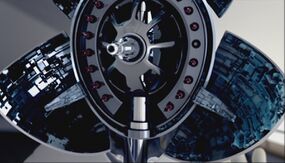Handbot
The 17th Generation Handroid Handbot 8001 , also known as a Handbot, was an alien medical robot designed to assist residents of the Two Streams Facility on Apalapucia, providing guidance and — if necessary — medicine (known as "kindnesses") to the patients.
Features[[edit] | [edit source]]
The Handbots were approximately six feet tall, white and humanoid. Their hands were their most prominent features, serving many strange and mundane purposes. They use them to manipulate objects such as hypodermic needles, which they carried in their chests and heads. With the aid of synthetic, organic skin grafted onto their hands, they were used for sensory perception, "seeing" with their fingers. This form of sight was so potent that Handbots could see the types of bacteria on a person. The eponymous hands also held anaesthetic transfer: one touch was all it took to send someone to sleep in moments.
Handbots communicated to a degree with the patients but lacked any kind of intelligence. If a person's reply to a Handbot did not match an "acceptable" reply, the statement would be rejected and the handbot would continue any course of action it deemed appropriate.
The Handbots were equipped with hypodermic needles and darts, which they used to administer their "kindnesses". The syringes were held in a chest compartment and given by hand. The darts were held inside the head for feistier residents and were shot at patients in what was known as the "secondary delivery system". Administration of medicine would usually be accompanied by a set dialogue: "Do not be alarmed. This is a kindness." They could be reprogrammed to be docile (as in the case of Rory); however Amy literally "disarmed" the robot, suggesting that even docile it could still be dangerous.
Inside the chest cavity, Handbots also held a "black box recorder", which would record any cause of termination. The Handbots could walk from place to place and jump between time streams, though they didn't teleport (despite the appearance of the time jump).
Despite their many features, Handbots were less than formidable. Their sensors malfunctioned in the presence of temporal engines, they were slow-moving and they were easily knocked out by blunt or sharp force. Furthermore, if the hands of Handbots touched it created a feedback loop that would knock them out. Only in great numbers did the Handbots pose a real threat to people.
Handbots were not intended to be deadly, but the drugs inside them were not safe for all species to handle. For humans, some were lethal, which the Handbots had no way of discerning, being equipped to handle Apalapucians and other patients with binary vascular systems. (TV: The Girl Who Waited)
History[[edit] | [edit source]]
Historians concluded that incidents with the Handbots, as well as the Heavenly Host, Kerblam! Men, and Voc Robots, gave electronic robots a reputation for being dangerously unreliable, causing engineers to revert to earlier, classic technologies leading to the Clockwork Droids of the 51st century. (PROSE: The Monster Vault)
Behind the scenes[[edit] | [edit source]]
Conception[[edit] | [edit source]]
- Writer Tom MacRae has said that one of the scariest Doctor Who moments for him personally was a scene in Terror of the Vervoids where Vervoids attacked a man using deadly seed pods delivered from their hands. He speculated that the idea of hands being frightening may have subconsciously inclined him to create the Handbots.
- He also stated there was a deleted scene where one of the Handbot's hands would be sliced off the robot but still crawl towards Amy and Rory, commenting he would bring back such a feature if the Handbots ever returned.
Doctor Who: Legacy[[edit] | [edit source]]
In the story of Doctor Who: Legacy, the Doctors and their companions face the Handbots at the Two Streams Facility on Apalapucia.

